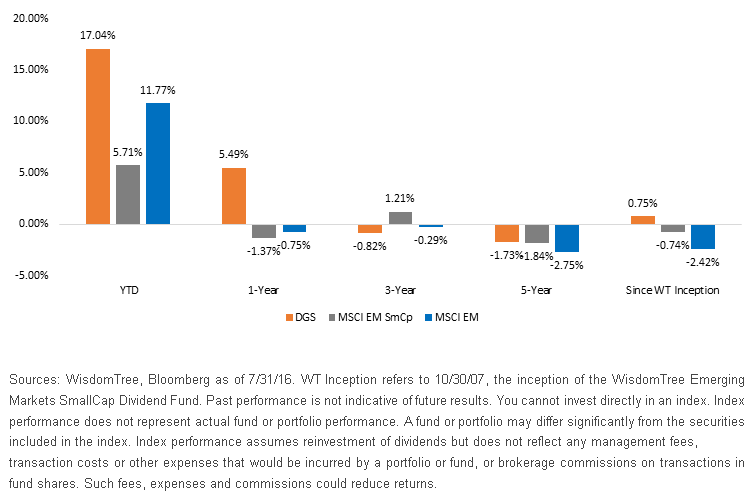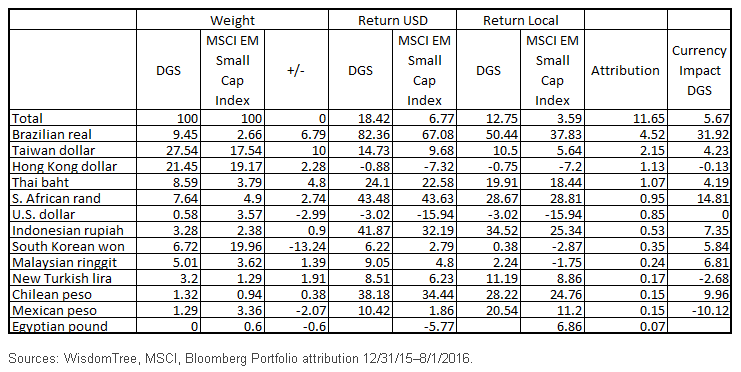Target Your Emerging Markets Exposure with Small Caps


 Attribution: What Is Driving This Year’s Outperformance?
The table below shows the top five countries (classified by currency exposure) adding to the returns of DGS compared to the traditional MSCI benchmarks. Some of the key stories for the strongest returns in DGS are out of Brazil, South Africa and Thailand.
• Brazil has been a great performer, partly with its currency but also the stock selection within the small-cap side of the market. Brazil small caps in DGS are up over 80% in 2016 and averaged over 9% weight in the DGS. The MSCI EM Small Cap Index had less than 3% weight to Brazil small caps, and this led to 450 basis point (bps) of outperformance over the MSCI Emerging Markets Small Cap Index. Taiwan small-cap dividend payers, over-weight in DGS, also had better performance than cap-weighted Taiwan small caps, and that led to positive attribution.
• Hong Kong exposure—representing China stocks—was another place where the dividend-weighted approach added value from a stock selection basis, as Hong Kong stocks in DGS returned over 6% higher returns than China stocks in the MSCI Emerging Markets Small Cap Index.
• South African small- cap dividend payers were up 43%, with approximately 15% coming from currency gains.
Attribution: What Is Driving This Year’s Outperformance?
The table below shows the top five countries (classified by currency exposure) adding to the returns of DGS compared to the traditional MSCI benchmarks. Some of the key stories for the strongest returns in DGS are out of Brazil, South Africa and Thailand.
• Brazil has been a great performer, partly with its currency but also the stock selection within the small-cap side of the market. Brazil small caps in DGS are up over 80% in 2016 and averaged over 9% weight in the DGS. The MSCI EM Small Cap Index had less than 3% weight to Brazil small caps, and this led to 450 basis point (bps) of outperformance over the MSCI Emerging Markets Small Cap Index. Taiwan small-cap dividend payers, over-weight in DGS, also had better performance than cap-weighted Taiwan small caps, and that led to positive attribution.
• Hong Kong exposure—representing China stocks—was another place where the dividend-weighted approach added value from a stock selection basis, as Hong Kong stocks in DGS returned over 6% higher returns than China stocks in the MSCI Emerging Markets Small Cap Index.
• South African small- cap dividend payers were up 43%, with approximately 15% coming from currency gains.
 Given some of these large gains in countries such as Brazil, Indonesia and South Africa—returns of greater than 40% when average returns were closer to 18% across the region—investors may start to worry about those stocks running too much. Managing valuation risk is a key element of the WisdomTree Index family that incorporates a relative value rebalance.
We are coming up on the annual emerging markets rebalance in October, which will look at stocks becoming more expensive relative to their dividends. The WisdomTree Index process is designed to reduce weight in those stocks that have become more expensive (whose prices are appreciating more than dividends) while adding to weight in stocks that are becoming relatively less expensive (whose prices are falling more than dividends or whose dividends are growing relative to prices).
This process has added value in terms of higher returns over the long run compared to traditional indexes, and years like 2016 with sharp moves higher are classic cases of why we like to rebalance back to underlying fundamentals of companies.
Also, for those investors who think that small-cap companies are more volatile than large caps and that it sounds especially volatile to allocate to emerging market small caps, it may be surprising that since the inception of DGS, the beta of this Index relative to the MSCI Emerging Markets Index of large caps was .89 and the volatility was 1.13% lower.3
Given that traditional benchmarks have very little exposure to emerging market small caps, we’d encourage investors to look at emerging market small-cap dividend payers as a diversifier for their emerging market allocations.
1Sources: WisdomTree, Bloomberg.
2Designed to track the WisdomTree Emerging Markets SmallCap Dividend Index after fees and expenses.
3Sources: WisdomTree, StyleAdvisor as of 6/30/16. Refers to three-year period ending 6/30/16.
Given some of these large gains in countries such as Brazil, Indonesia and South Africa—returns of greater than 40% when average returns were closer to 18% across the region—investors may start to worry about those stocks running too much. Managing valuation risk is a key element of the WisdomTree Index family that incorporates a relative value rebalance.
We are coming up on the annual emerging markets rebalance in October, which will look at stocks becoming more expensive relative to their dividends. The WisdomTree Index process is designed to reduce weight in those stocks that have become more expensive (whose prices are appreciating more than dividends) while adding to weight in stocks that are becoming relatively less expensive (whose prices are falling more than dividends or whose dividends are growing relative to prices).
This process has added value in terms of higher returns over the long run compared to traditional indexes, and years like 2016 with sharp moves higher are classic cases of why we like to rebalance back to underlying fundamentals of companies.
Also, for those investors who think that small-cap companies are more volatile than large caps and that it sounds especially volatile to allocate to emerging market small caps, it may be surprising that since the inception of DGS, the beta of this Index relative to the MSCI Emerging Markets Index of large caps was .89 and the volatility was 1.13% lower.3
Given that traditional benchmarks have very little exposure to emerging market small caps, we’d encourage investors to look at emerging market small-cap dividend payers as a diversifier for their emerging market allocations.
1Sources: WisdomTree, Bloomberg.
2Designed to track the WisdomTree Emerging Markets SmallCap Dividend Index after fees and expenses.
3Sources: WisdomTree, StyleAdvisor as of 6/30/16. Refers to three-year period ending 6/30/16.
Important Risks Related to this Article
There are risks associated with investing, including possible loss of principal. Foreign investing involves special risks, such as risk of loss from currency fluctuation or political or economic uncertainty. Funds focusing on a single sector and/or smaller companies generally experience greater price volatility. Investments in emerging, offshore or frontier markets are generally less liquid and less efficient than investments in developed markets and are subject to additional risks, such as risks of adverse governmental regulation, intervention and political developments. Due to the investment strategy of this Fund, it may make higher capital gain distributions than other ETFs. Please read the Fund’s prospectus for specific details regarding the Fund’s risk profile.

Jeremy Schwartz has served as our Global Chief Investment Officer since November 2021 and leads WisdomTree’s investment strategy team in the construction of WisdomTree’s equity Indexes, quantitative active strategies and multi-asset Model Portfolios. Jeremy joined WisdomTree in May 2005 as a Senior Analyst, adding Deputy Director of Research to his responsibilities in February 2007. He served as Director of Research from October 2008 to October 2018 and as Global Head of Research from November 2018 to November 2021. Before joining WisdomTree, he was a head research assistant for Professor Jeremy Siegel and, in 2022, became his co-author on the sixth edition of the book Stocks for the Long Run. Jeremy is also co-author of the Financial Analysts Journal paper “What Happened to the Original Stocks in the S&P 500?” He received his B.S. in economics from The Wharton School of the University of Pennsylvania and hosts the Wharton Business Radio program Behind the Markets on SiriusXM 132. Jeremy is a member of the CFA Society of Philadelphia.

